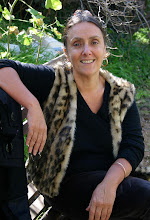The huge,
shaggy wolf waited alone for the first light of dawn. The sky covered the
mountain peaks in a vast darkness, but the wolf could smell the Sun rising
towards the day.
In the valley
below, fireflies ceased their nocturnal blinking, winking out one by one. A
lone eagle rode the breeze, gliding in spirals down the slopes. The old wolf
sniffed the air and licked his lips. The breeze promised clear skies.
The wolf
settled slowly onto his belly and lowered his head onto his paws. He dreamed of
hunting like a shadow, chasing lovers from midnight trysts, frightening
children on forest paths. He could dream, but his body ached and his eyes
no longer saw the stars at night or the mice scurrying in the grass. Even
the
moon did not
stir him as it once had.
The wolf
growled, a low rumble in his belly. The wind brought warning of the pious monk
who walked the mountain trails to speak with the animals. Small and
fine-boned, the monk came where he was not wanted, venturing further than
others dared.
“Brother Wolf,”
called the monk. "Hear me, Brother. The people accuse you and curse you.
But I come to make peace between you and the people. You no longer need to
terrorise the children. No more do you need to steal the cows and goats.”
The wolf could
have told the monk that his desire to evoke terror was all but gone, but the
holy man barely paused for breath.
“The women will
cook you a pot of oatmeal every morning. The children will gather eggs for your
evening meal. The dogs will stop chasing you, and the men will stop
shooting at you. Consider this well, Brother.”
The wolf
howled, a sound that had once paralysed goats and sent children scurrying home
to their mothers.
The monk knelt
on the mountain path to pray, his tonsured head glowing in the sunlight.
The wolf turned away.
The monk finished his prayers and walked back down
the trail.
The wolf followed, padding softly in the man’s
footsteps. Halfway down, he settled
behind a large boulder. Butterflies flitted around his head, tickling
his ears, and birds told stories from the treetops. The wolf dozed,
dreams moving through his body in remembered leaps and bounds.
The sun settled
into the west, and the monk returned, singing as he walked. "Brother Sun,
Sister Moon . . ."
Brother this!
Sister that! Didn’t the little man have a family of his own? Quiet as a shadow, the wolf stepped
into the monk’s path. The singing
stopped.
“Brother Wolf!
Just the one I was coming to see,” said the monk, smiling benevolently.
The wolf curled
his lip.
"I have
come to make you an offer,” said the monk.
“I know.
Oatmeal, eggs, and no shooting.”
“All things
considered, a generous offer,” said the monk.
The wolf sighed
deeply. “Tell me more of the people who make these promises. Do they watch in
awe as Sun rises each day? Do they hear the stories riding on Wind? Do they
drink deeply of Water sprung from Earth that is our Mother?”
“Come, Brother,
the townsfolk are waiting for you,” said the monk, looking away.
The wolf moved
closer. “You call me Brother, yet you do not meet my eyes. Do these people of
yours no longer look to Sun and Wind, no longer call Earth their Mother?”
“It is a time
of change,” said the monk.
“Do you not
sing of the lilies of the field?” asked the wolf. “Have the people not heard
your songs?”
The monk
shuffled his bare feet. “I sing of the lilies, but not all understand my
words.”
The wolf sighed
again. “I am tired. I will come down with you. Perhaps they will tell the story
of the monk and the wolf when we are both gone.”
“Perhaps they
will,” said the monk.
They walked slowly down the mountain together,
the huge, old wolf and the diminutive monk.
At the last
bend in the trail, the wolf stopped. The hair along his neck rose in warning,
and he braced to run.
But it was too
late, and he was too slow.
The men of the
town cast a net woven by the women with hatred in their hearts. They pulled the
wolf, struggling and biting, into the town square. The children threw stones,
and the young men stabbed with sharp sticks. Finally they hauled him, net and
all, onto a pyre. Battered and broken, he lifted his shaggy head to look at the
monk.
“Why?” he
asked. “Brother.”
“Because a
beast is always a beast,” said the monk. “And beasts cannot know Spirit.” He threw a burning brand onto the pyre.
The wolf closed
his wise, yellow eyes and howled.
The mournful
cry echoed through the forest and across the mountains. The sound lingered at
the edge of memory, haunting the dreams of the townsfolk, stalking the
cobblestone lanes and mighty cathedrals of faraway cities. It resounded for
seven generations, stirring nightmares.
Some say it
lingers still in the mountain passes, riding the wind, entering the dreams of
men who no longer watch in awe as the sun rises, disturbing the sleep of women
who no longer listen for the stories in the air, stealing the innocence of
children who no longer drink deeply of the water that springs from the earth.
It resonates like a warning from the places where wolves no longer wait for the
dawn.
Have you heard it?

